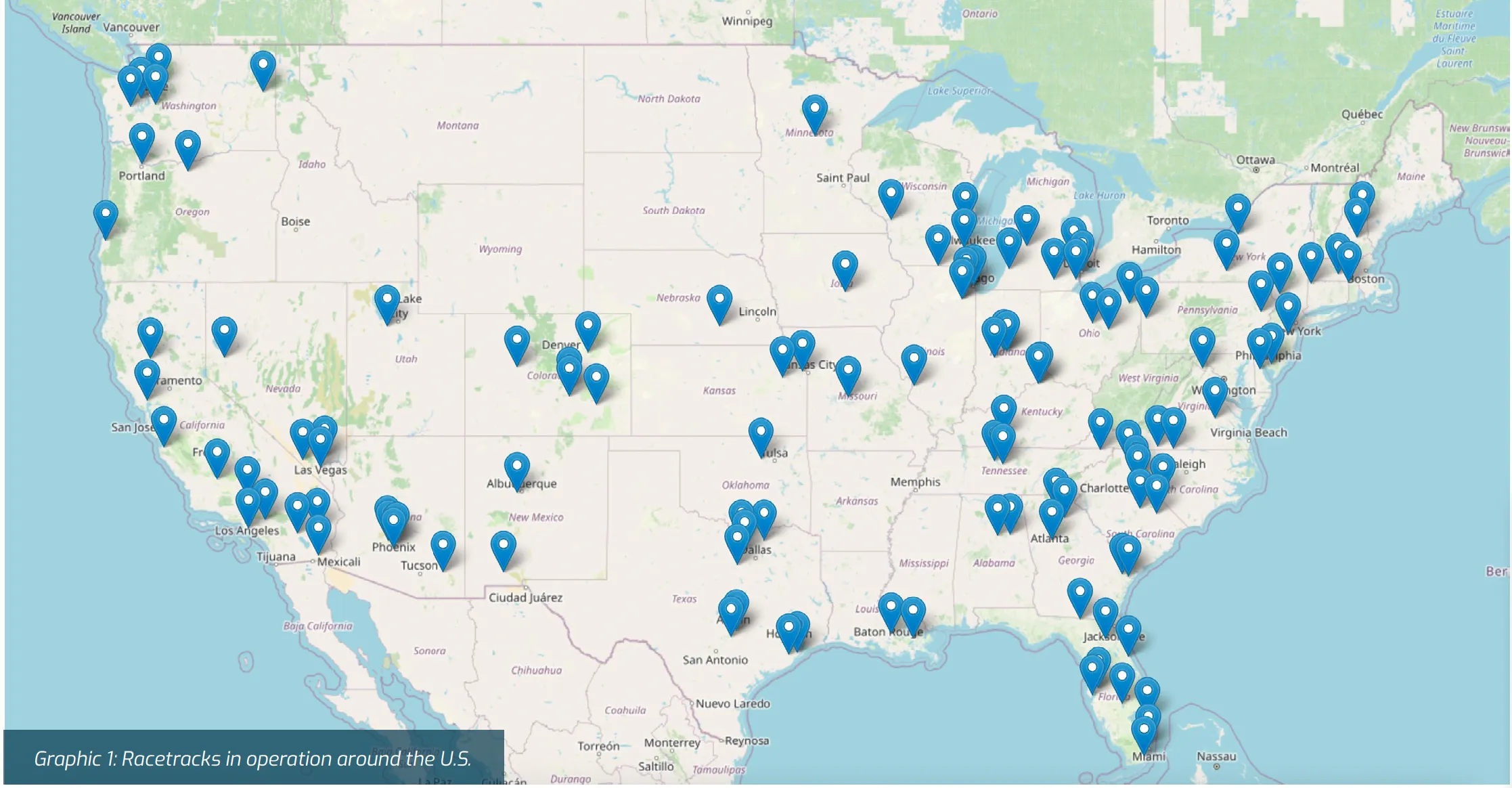
The Evolution and Future of the U.S. Motorsport Industry
August 2024

Michael Mücke
The Evolution and Future of the U.S. Motorsport Industry
The U.S. motorsport industry is a vibrant sector that has evolved significantly over the years, featuring major racing events such as Formula 1, NASCAR, IndyCar, and MotoGP. This industry is not only a major cultural phenomenon but also a significant economic driver, generating substantial revenue through broadcasting rights, ticket sales, merchandising, sponsorships, and hosting fees.
Globally, the motorsports market was valued at approximately $5.9 billion in 2021 and is projected to reach $17.0 billion by 2032, with a compound annual growth rate (CAGR) of 10%1. Beyond these global growth projections, the industry is experiencing expansion through key developments such as the extension of racing calendars (e.g., FIA World Endurance Championship), the launch of new racing series (e.g., Electric GT Championship, FIA's Electric Sport Vehicle category), and increasing viewership and attendance at motorsport events. These trends underscore the industry's robust trajectory.
The growth of the motorsports industry is driven by several key factors that extend its reach and increase its popularity. High-quality documentaries and behind-the-scenes content have humanized drivers and teams, creating compelling stories that resonate with audiences beyond traditional racing fans. Moreover, motorsport organizations and teams have utilized social media platforms to engage directly with their fanbase, offering exclusive content, real-time updates, and interactive experiences that foster a deeper connection with supporters. Additionally, the rise of realistic racing simulators and esports competitions has created new entry points for younger audiences to engage with motorsports, sparking interest in real-world events and broadening the industry's appeal.
MARKET TRENDS.
As the U.S. motorsports industry evolves, several key trends are shaping its future. Technological advancements are at the forefront, with initiatives like Formula 1's hybrid power units enhancing efficiency and performance while promoting sustainability. The industry is increasingly focused on eco-friendly practices, as seen in Formula E and the adoption of alternative fuels, which aim to reduce carbon footprints. Diversity and inclusion efforts are also gaining traction, exemplified by NASCAR's Drive for Diversity program and the establishment of the all-female W Series. The rise of private racetracks, such as Monticello Motor Club, caters to exclusive audiences, while the popularity of sim racing platforms like iRacing attract younger fans. The global expansion of motorsports events, such as MotoGP's entry into new markets, further broadens the sport's appeal. Streaming platforms are also revolutionizing how fans consume content, and data analytics is increasingly utilized to tailor fan experiences and optimize team strategies. These trends collectively position the motorsports industry for continued growth and innovation.
GROWTH IN THE PRIVATE RACETRACK SEGMENT.
The private racetrack segment within the U.S. motorsports industry is experiencing significant growth, driven by a combination of factors that cater to both enthusiasts and businesses. This niche market is characterized by exclusive memberships, state-of-the-art facilities, and personalized experiences that set it apart from traditional public racetracks.
According to an MRC study, the U.S. currently boasts over 115 racetracks, with the number expanding by 3 to 5 new tracks each year. This growth is largely fueled by increasing demand for personalized racing environments and rising luxury consumer spending. A key factor in this segment's success is the diversification of revenue streams, contributing to its financial stability. In addition to membership fees and track rentals, many private racetracks are capitalizing on corporate events, driving schools, and real estate developments, further strengthening their place in the motorsports industry.

Revenue Model of Private Racetracks.
Private racetracks generate revenue through various streams, including membership fees, which can range from basic access to all-inclusive packages that offer extensive amenities. They also profit from driving experiences, karting, hosting corporate events, professional driver training programs, and exclusive racing events. Additionally, many tracks offer premium services such as car storage, maintenance, and personal coaching, further enhancing their revenue model.
Facilities like the Thermal Club in California and Monticello Motor Club in New York set the standard for luxury and exclusivity. However, the segment is expected to diversify, establishing a range of offerings from ultra-luxurious experiences to more accessible driving clubs, such as The Motor Enclave in Florida. This variety will cater to a broader audience, from those seeking high-end exclusivity to enthusiasts looking for a straightforward, quality driving experience. While the motorsport industry contributes $178m to the global economy annually2, this segment has a substantial potential to further contribute to the overall growth of the motorsport industry. As private racetracks become more established, they will continue to evolve, providing a wide array of options that meet different levels of interest and investment in the sport. This development not only enriches the motorsport landscape but also ensures sustainable growth by attracting diverse segments of racing enthusiasts.
Outlook racetrack business in the U.S.
The U.S. racetrack industry, both private and public, is poised for continued growth.
To ensure future success, expanding the revenue mix will be crucial. The core business of a racetrack is expanding to include real estate offerings such as villas and garages. The Circuit of the Americas demonstrates with the offering of the T11 Car Condos, that even established public racetracks are tapping into additional revenue streams. Partnerships with OEMs through sponsorships and driving experience centers are becoming increasingly relevant and ensure the baseline utilization of a racetrack. Embracing the electric vehicle (EV) era by preparing tracks to accommodate electric vehicles developing charging infrastructure and hosting EV races will be key. Atlanta Motorsports Park (AMP) was the first racetrack with Level 3 Fast Charger Infrastructure and Jeremy Porter (CEO of AMP) is convinced that EVs will be the future of racing. Lastly, investing in digital experiences such as SIM racing, and adopting a comprehensive approach to meeting the needs and opportunities of all customer segments, will solidify the industry’s long-term vitality. OEMs, such as BMW, and racetracks are already working closely with gaming developers to reach new target groups and bring racing into the living rooms of the public.
MRC Motorsport Consulting.
Mücke Roth & Company offers comprehensive consulting services to motorsport operators, investors, and visionaries. We assist in transforming industry trends into viable business models by providing market analysis, competitive positioning, product development, financial forecasting, marketing strategy, and investor acquisition. Our expertise helps clients create sustainable, customer-focused motorsport projects, from pitch deck preparation to strategic partnerships and business model expansion.
AUTHOR.
Michael is the founder and CEO of MRC. He specializes in developing innovative business models and scaling them effectively, with a particular focus on the motorsport industry. As a successful investor, he also supports startups in shaping their business models for commercial success.

Michael Mücke
Managing Director
Michael ist Experte in den Bereichen Digitalisierung und IoT und hat zahlreiche Unternehmen persönlich bei der digitalen Transformation begleitet. Sein Fokus liegt u. a. auf den Themengebieten datenbasierte Geschäftsmodelle, Strategieentwicklung und Künstliche Intelligenz. Nach seiner Zeit bei A.T. Kearney hat er ein erfolgreiches Start-up gegründet und ist als Serieninvestor an mehreren digitalen Start-ups beteiligt – und dort auch in deren Management Boards vertreten.
